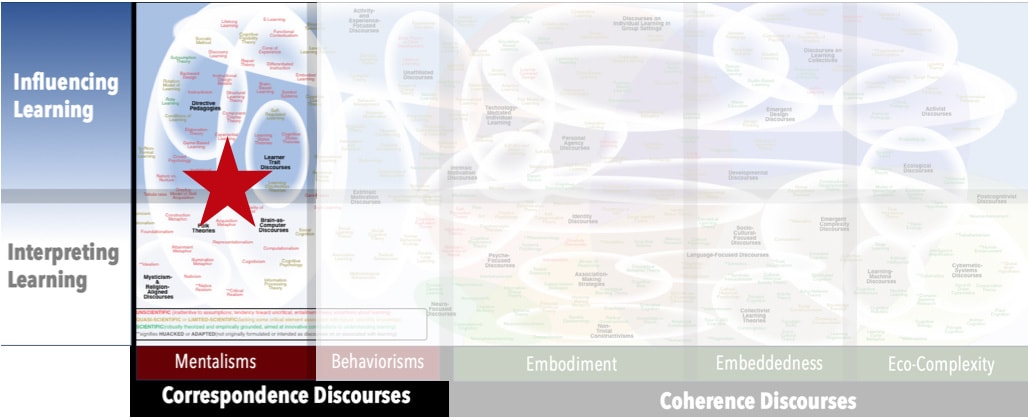Focus
The relative influence of heredity and experience on one’s learning and abilitiesPrincipal Metaphors
Nature vs. Nurture is not explicit on what learning is or how it happens, merely on the relative importance of heredity and experience on learning. That said, the vocabulary invoked in popular debates is most often reflective of Folk Theories, and notions associated with the Attainment Metaphor figure especially prominently:- Knowledge is … territories/areas/domains/fields (typically involving challenge)
- Knowing is … attaining a goal
- Learner is … a seeker (individual)
- Learning is … journeying (arriving at, reaching, progressing, accomplishing, achieving)
- Teaching is … leading, guiding, directing, facilitating
Originated
1500sSynopsis
Nature vs. Nurture refers to a longstanding popular debate on the relative influences of heredity and experience on one’s learning, abilities, and identity. In one way or another, almost every theory of learning weighs in on the matter, especially since the early 1900s when some Behaviorisms challenged centuries of assumption by asserting that all human behavior is environmentally determined. Associated constructs and discourses include:- Aptitude – an assumed-to-be-innate ability or disposition in relation to a specific discipline or type of work
- Biological Determinism (Biologism; Genetic Determinism) – the assertion that one’s intelligence, dispositions, and behaviors are controlled by one’s genes. (Compare Environmental Determinism, below.)
-
Epigenesis (Neoformationism) – a perspective that plant or animal development unfolds as a sequence of processes involving formation of cells, cell masses, organs, and organ systems. (Compare Preformationism, below.)
- Environmental Determinism – the perspectival that one’s intelligence, dispositions, and behaviors are controlled by environmental circumstances. (Compare Biological Determinism, above.)
- Essentialism – the belief that human identity pre-exists language, culture, and experience. (The term is also used to refer to the doctrine, inherited from ancient Greek philosophy, that material objects have an essence that can be distinguished from their physical attributes. Dogs, for example, are assumed to be dogs because of they have the essential quality of dogness.) Essentialism is tethered to the assumption that the universe is as it always was; it does not evolve.
- Heritability (Inheritance) – the extent to which an offspring’s state resembling the corresponding traits of its parents. The notion is somewhat ambiguous notion within Nature vs. Nurture debates, as it has been used to refer to traits influenced by genetics and/or through responses to different environmental pressures.
- Human Nature – in popular terms, those assumed-to-be-innate dispositions and behaviors that are further assumed to be common to all humankind
- Instructional Theory of Development – the perspective that brain development is more a matter of nurture than nature
- Mechanistic Interactionism – a Mechanistic Theory (see Reductionism) that aims to explain behavior in terms of a combination of individual factors and situational factors
- Preformationism (Preformism) – a once-popular (now debunked) theory that the “forms” of organisms exist prior to their birth – and, so, their development is a process of enlarging small copies of themselves. Within some religion-based versions of Preformationism, such forms are thought either to pop into existence at conception or to have been present since creation. (Compare Epigenesis, above.)
Commentary
Most criticisms of Nature vs. Nurture focus more on the manner of thinking that infuses the debate than on the terms of the debate itself. That is, the Nature vs. Nurture debate relies on a this-or-that, zero-sum, category-imposing cluster of assumptions. Contemporary perspectives on the topic tend to shift the focus of the discussion from “which has greater influence” to “how they work together.” Coupled to this shift is a redefinition of personal potential, away from a once-dominant belief in limits (defined by genetics and realized or denied by experience) and toward an ever-changing horizon of possibilities (dependent on, but not determined by either genetics or experience).Authors and/or Prominent Influences
Francis GaltonStatus as a Theory of Learning
Nature vs. Nurture is typically deployed as a theory of learning.Status as a Theory of Teaching
Nature vs. Nurture is not a theory of teaching.Status as a Scientific Theory
Researchers consumed by the Nature vs. Nurture debate often assert that there is substantial empirical evidence of the “reality” of the phenomenon. In particular, comparisons of identical twins who have been raised separately to those raised together appear to reveal that such qualities as intelligence and personality traits are strongly heritable. Much of this evidence has been contested, and the portions that have been demonstrated as valid can be more readily explained in terms of interacting (rather than competing) elements. Phrased differently, those who engage in Nature vs. Nurture debate rarely analyze their assumptions about learning, and consequently help to perpetuate indefensible dualisms.Subdiscourses:
- Aptitude
- Biological Determinism (Biologism; Genetic Determinism)
- Environmental Determinism
- Epigenesis (Neoformationism)
- Essentialism
- Heritability (Inheritance)
- Human Nature
- Instructional Theory of Development
- Mechanistic Interactionism
- Preformationism (Preformism)
Map Location

Please cite this article as:
Davis, B., & Francis, K. (2023). “Nature vs. Nurture” in Discourses on Learning in Education. https://learningdiscourses.com.
⇦ Back to Map
⇦ Back to List
